黑马点评6
黑马点评6
达人探店
发布探店笔记
tb_blog表 :
create table tb_blog
(
id bigint unsigned auto_increment comment '主键'
primary key,
shop_id bigint not null comment '商户id',
user_id bigint unsigned not null comment '用户id',
title varchar(255) collate utf8mb4_unicode_ci not null comment '标题',
images varchar(2048) not null comment '探店的照片,最多9张,多张以","隔开',
content varchar(2048) collate utf8mb4_unicode_ci not null comment '探店的文字描述',
liked int unsigned default '0' null comment '点赞数量',
comments int unsigned null comment '评论数量',
create_time timestamp default CURRENT_TIMESTAMP not null comment '创建时间',
update_time timestamp default CURRENT_TIMESTAMP not null on update CURRENT_TIMESTAMP comment '更新时间'
)
collate = utf8mb4_general_ci
row_format = COMPACT;
tb_blog_comments表:
create table tb_blog_comments
(
id bigint unsigned auto_increment comment '主键'
primary key,
user_id bigint unsigned not null comment '用户id',
blog_id bigint unsigned not null comment '探店id',
parent_id bigint unsigned not null comment '关联的1级评论id,如果是一级评论,则值为0',
answer_id bigint unsigned not null comment '回复的评论id',
content varchar(255) not null comment '回复的内容',
liked int unsigned null comment '点赞数',
status tinyint unsigned null comment '状态,0:正常,1:被举报,2:禁止查看',
create_time timestamp default CURRENT_TIMESTAMP not null comment '创建时间',
update_time timestamp default CURRENT_TIMESTAMP not null on update CURRENT_TIMESTAMP comment '更新时间'
)
collate = utf8mb4_general_ci
row_format = COMPACT;
上传文件接口:
@PostMapping("blog")
public Result uploadImage(@RequestParam("file") MultipartFile image) {
try {
// 获取原始文件名称
String originalFilename = image.getOriginalFilename();
// 生成新文件名
String fileName = createNewFileName(originalFilename);
// 保存文件
image.transferTo(new File(SystemConstants.IMAGE_UPLOAD_DIR, fileName));
// 返回结果
log.debug("文件上传成功,{}", fileName);
return Result.ok(fileName);
} catch (IOException e) {
throw new RuntimeException("文件上传失败", e);
}
}
修改路径为 自己的nginx前端里面的img目录:
public static final String IMAGE_UPLOAD_DIR = "/opt/homebrew/var/www/hmdp/imgs/";
发布博客 :
@PostMapping
public Result saveBlog(@RequestBody Blog blog) {
// 获取登录用户
UserDTO user = UserHolder.getUser();
blog.setUserId(user.getId());
// 保存探店博文
blogService.save(blog);
// 返回id
return Result.ok(blog.getId());
}
查看探店笔记
控制器 :
@GetMapping("/{id}")
public Result queryBlogById(@PathVariable("id") Long id) {
return blogService.queryBlogById(id);
}
实现类 :
@Override
public Result queryBlogById(Long id) {
// 根据id查询
Blog blog = this.getById(id);
if (blog == null) {
return Result.fail("博文不存在");
}
// 查询用户
queryBlogUser(blog);
return Result.ok(blog);
}
private void queryBlogUser(Blog blog) {
Long userId = blog.getUserId();
User user = userService.getById(userId);
blog.setName(user.getNickName());
blog.setIcon(user.getIcon());
}
点赞功能
需求:
- 同一个用户只能点赞一次,再次点击则取消点赞
- 如果当前用户已经点赞,则点赞按钮高亮显示(前端已实现,判断字段Blog类的isLike属性)
实现步骤: - 给Blog类中添加一个isLike字段,标示是否被当前用户点赞
- 修改点赞功能,利用Redis的set集合判断是否点赞过,未点赞过则点赞数+1,已点赞过则点赞数-1
- 修改根据id查询Blog的业务,判断当前登录用户是否点赞过,赋值给isLike字段
- 修改分页查询Blog业务,判断当前登录用户是否点赞过,赋值给isLike字段
给Blog添加字段:
/**
* 是否点赞过了
*/
@TableField(exist = false)
private Boolean isLike;
修改业务代码:
@Override
public Result likeBlog(Long id) {
//判断当前用户 是否已经点赞
Long userId = UserHolder.getUser().getId();
String key = BLOG_LIKED_KEY + id;
Boolean isMember = stringRedisTemplate.opsForSet().isMember(key, userId.toString());
if (BooleanUtil.isFalse(isMember)) {
//没有点赞 ,点赞数+1 ,保存到redis
boolean isSuccess = this.update().setSql("like=like+1").eq("id", id).update();
if (isSuccess) {
stringRedisTemplate.opsForSet().add(key, userId.toString());
}
} else {
//已经点赞,点赞数-1 ,从redis删除
boolean isSuccess = this.update().setSql("like=like-1").eq("id", id).update();
if (isSuccess) {
stringRedisTemplate.opsForSet().remove(key, userId.toString());
}
}
return Result.ok();
}
修改关于博客是否被当前用户点赞:
@Override
public Result queryBlogById(Long id) {
// 根据id查询
Blog blog = this.getById(id);
if (blog == null) {
return Result.fail("博文不存在");
}
// 查询用户
queryBlogUser(blog);
isBlogLiked(blog);
return Result.ok(blog);
}
private void isBlogLiked(Blog blog) {
Long userId = UserHolder.getUser().getId();
String key = BLOG_LIKED_KEY + blog.getId();
Boolean isMember = stringRedisTemplate.opsForSet().isMember(key, userId.toString());
blog.setIsLike(BooleanUtil.isTrue(isMember));
}
@Override
public Result queryHotBlog(Integer current) {
// 根据用户查询
Page<Blog> page = this.query()
.orderByDesc("liked")
.page(new Page<>(current, SystemConstants.MAX_PAGE_SIZE));
// 获取当前页数据
List<Blog> records = page.getRecords();
// 查询用户
records.forEach(blog -> {
this.isBlogLiked(blog);
this.queryBlogUser(blog);
});
return Result.ok(records);
}
点赞排行榜
在探店笔记的详情页面,应该把给该笔记点赞的人显示出来,比如最早点赞的TOP5,形成点赞排行榜:
之前的点赞是放到set集合,但是set集合是不能排序的,所以这个时候,咱们可以采用一个可以排序的set集合,就是咱们的sortedSet
⚠️upload failed, check dev console
修改likeblogs
@Override
public Result likeBlog(Long id) {
//判断当前用户 是否已经点赞
Long userId = UserHolder.getUser().getId();
String key = BLOG_LIKED_KEY + id;
Double isMember = stringRedisTemplate.opsForZSet().score(key, userId.toString());
if (isMember == null) {
//没有点赞 ,点赞数+1 ,保存到redis
boolean isSuccess = this.update().setSql("liked=liked+1").eq("id", id).update();
//zadd key value score
if (isSuccess) {
stringRedisTemplate.opsForZSet().add(key, userId.toString(), System.currentTimeMillis());
}
} else {
//已经点赞,点赞数-1 ,从redis删除
boolean isSuccess = this.update().setSql("liked=liked-1").eq("id", id).update();
if (isSuccess) {
stringRedisTemplate.opsForZSet().remove(key, userId.toString());
}
}
return Result.ok();
}
private void isBlogLiked(Blog blog) {
Long userId = UserHolder.getUser().getId();
String key = BLOG_LIKED_KEY + blog.getId();
Double isMember = stringRedisTemplate.opsForZSet().score(key, userId.toString());
blog.setIsLike(isMember != null);
}
点赞查询列表
控制器:
@GetMapping("/likes/{id}")
public Result queryBlogLikes(@PathVariable("id") Long id) {
return blogService.queryBlogLikes(id);
}
业务层:
@Override
public Result queryBlogLikes(Long id) {
//查询top5点赞用户
String key = BLOG_LIKED_KEY + id;
Set<String> top5 = stringRedisTemplate.opsForZSet().range(key, 0, 4);
if (top5 == null || top5.isEmpty()) {
return Result.ok(Collections.emptyList());
}
//解析出用户 的id
List<Long> ids = top5.stream().map(Long::valueOf).collect(Collectors.toList());
//根据用户id查询用户信息
List<UserDTO> userDTOS = userService.listByIds(ids).stream()
.map(user -> {
return BeanUtil.copyProperties(user, UserDTO.class);
})
.collect(Collectors.toList());
return Result.ok(userDTOS);
}
此时会发现 点赞列表的顺序和时间戳不对应,因为 查数据库 的时候默认是按照id顺序,需要进行修改,按照我们穿进去的id的顺序进行排序
//解析出用户 的id
List<Long> ids = top5.stream().map(Long::valueOf).collect(Collectors.toList());
//根据用户id查询用户信息
List<UserDTO> userDTOS = userService.query().in("id", ids)
.last("ORDER BY FIELD(id," + StringUtil.join(ids, ",") + ")")
.list()
.stream()
.map(user -> {
return BeanUtil.copyProperties(user, UserDTO.class);
})
.collect(Collectors.toList());
return Result.ok(userDTOS);
好友关注
一个用户可以关注多个用户,一个用户也可以被多个用户关注,是多对多的关系:
需要建立一张关系表
create table tb_follow
(
id bigint auto_increment comment '主键'
primary key,
user_id bigint unsigned not null comment '用户id',
follow_user_id bigint unsigned not null comment '关联的用户id',
create_time timestamp default CURRENT_TIMESTAMP not null comment '创建时间'
)
collate = utf8mb4_general_ci
row_format = COMPACT;
控制器:
@RestController
@RequestMapping("/follow")
public class FollowController {
@Resource
private IFollowService followService;
@PutMapping("/{id}/{isFollow}")
public Result follow(@PathVariable("id") Long followUserId, @PathVariable("isFollow") Boolean isFollow) {
return followService.follow(followUserId, isFollow);
}
@PutMapping("/or/not/{id}")
public Result isFollow(@PathVariable("id") Long followUserId) {
return followService.isFollow(followUserId);
}
}
业务逻辑
@Override
public Result follow(Long followUserId, Boolean isFollow) {
Long userId = UserHolder.getUser().getId();
//判断是 关注 还是 取关
if (isFollow) {
//关注,添加关注记录
Follow follow = new Follow();
follow.setUserId(userId);
follow.setFollowUserId(followUserId);
this.save(follow);
} else {
//取关,删除关注记录
QueryWrapper<Follow> followQueryWrapper = new QueryWrapper<>();
followQueryWrapper.eq("user_id", userId).eq("follow_user_id", followUserId);
this.remove(followQueryWrapper);
}
return Result.ok();
}
@Override
public Result isFollow(Long followUserId) {
//1.查询是否关注
Long userId = UserHolder.getUser().getId();
Integer count = this.query().eq("user_id", userId).eq("follow_user_id", followUserId).count();
return Result.ok(count > 0);
}
共同关注
需求:利用Redis中恰当的数据结构,实现共同关注功能。在博主个人页面展示出当前用户与博主的共同关注呢。
当然是使用我们之前学习过的set集合咯,在set集合中,有交集并集补集的api,我们可以把两人的关注的人分别放入到一个set集合中,然后再通过api去查看这两个set集合中的交集数据。
改造当前关注用户的逻辑:
public Result follow(Long followUserId, Boolean isFollow) {
Long userId = UserHolder.getUser().getId();
//判断是 关注 还是 取关
String key = "follow:" + userId;
if (isFollow) {
//关注,添加关注记录
Follow follow = new Follow();
follow.setUserId(userId);
follow.setFollowUserId(followUserId);
boolean result = this.save(follow);
if (result) {
//放入redis
stringRedisTemplate.opsForSet().add(key, followUserId.toString());
}
} else {
//取关,删除关注记录
QueryWrapper<Follow> followQueryWrapper = new QueryWrapper<>();
followQueryWrapper.eq("user_id", userId).eq("follow_user_id", followUserId);
boolean result = this.remove(followQueryWrapper);
if (result) {
stringRedisTemplate.opsForSet().remove(key, followUserId.toString());
}
}
return Result.ok();
}
控制器:
@GetMapping("/common/{id}")
public Result followCommons(@PathVariable("id") Long id) {
return followService.followCommons(id);
}
业务逻辑:
@Override
public Result followCommons(Long id) {
Long userId = UserHolder.getUser().getId();
String key = "follow:" + userId;
String key2 = "follow:" + id;
Set<String> intersect = stringRedisTemplate.opsForSet().intersect(key, key2);
if (intersect == null || intersect.isEmpty()) {
return Result.ok(Collections.emptyList());
}
List<Long> ids = intersect.stream().map(Long::valueOf).collect(Collectors.toList());
List<UserDTO> users = userService.listByIds(ids)
.stream()
.map(user -> {
return BeanUtil.copyProperties(user, UserDTO.class);
})
.collect(Collectors.toList());
return Result.ok(users);
}
Feed流
当我们关注了用户后,这个用户发了动态,那么我们应该把这些数据推送给用户,这个需求,其实我们又把他叫做Feed流,关注推送也叫做Feed流,直译为投喂。为用户持续的提供“沉浸式”的体验,通过无限下拉刷新获取新的信息。
Feed流产品有两种常见模式: Timeline:不做内容筛选,简单的按照内容发布时间排序,常用于好友或关注。例如朋友圈
优点:信息全面,不会有缺失。并且实现也相对简单
缺点:信息噪音较多,用户不一定感兴趣,内容获取效率低
智能排序:利用智能算法屏蔽掉违规的、用户不感兴趣的内容。推送用户感兴趣信息来吸引用户优点:投喂用户感兴趣信息,用户粘度很高,容易沉迷
缺点:如果算法不精准,可能起到反作用
采用Timeline的模式。该模式的实现方案有三种:
我们本次针对好友的操作,采用的就是Timeline的方式,只需要拿到我们关注用户的信息,然后按照时间排序即可,因此采用Timeline的模式。该模式的实现方案有三种:拉模式
优点:比较节约空间,因为赵六在读信息时,并没有重复读取,而且读取完之后可以把他的收件箱进行清楚。
缺点:比较延迟,当用户读取数据时才去关注的人里边去读取数据,假设用户关注了大量的用户,那么此时就会拉取海量的内容,对服务器压力巨大。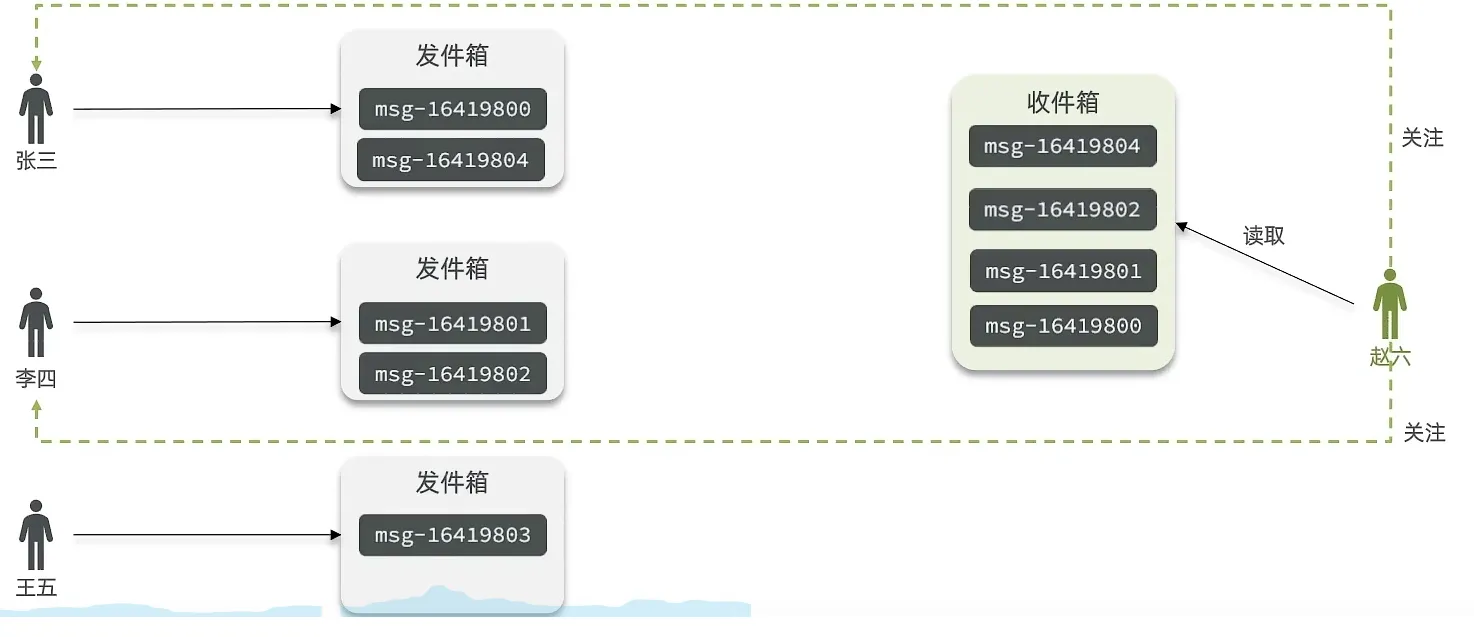
推模式
优点:时效快,不用临时拉取
缺点:内存压力大,假设一个大V写信息,很多人关注他, 就会写很多分数据到粉丝那边去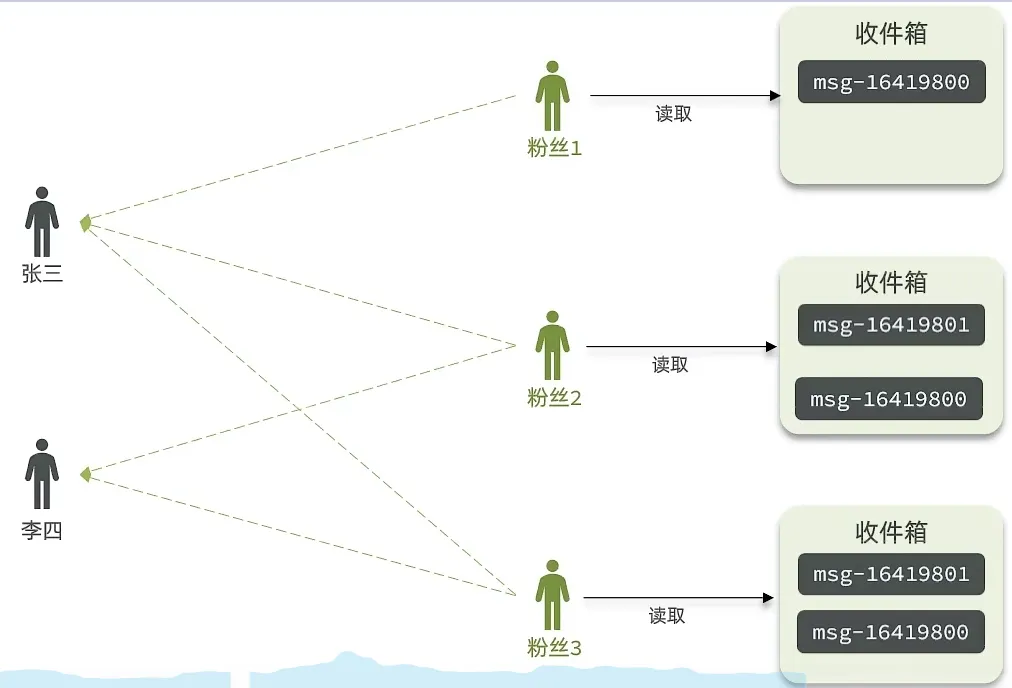
推拉结合
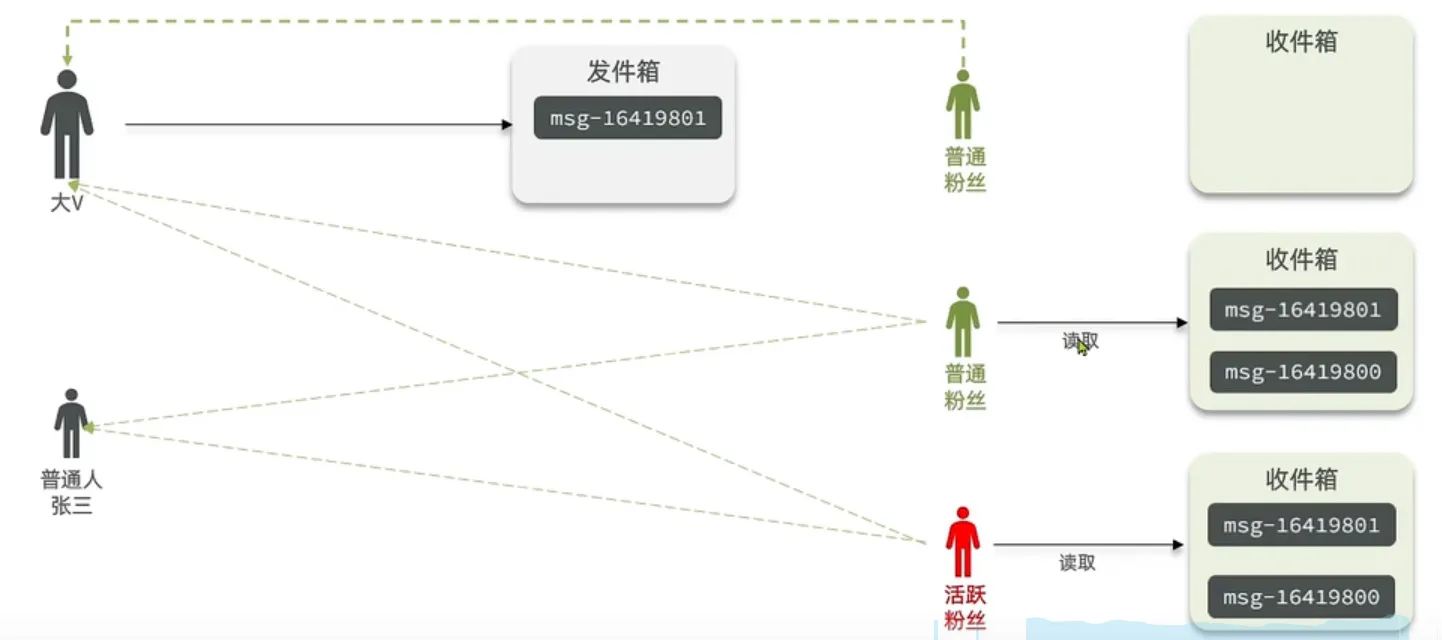
推送粉丝收件箱
需求:
- 修改新增探店笔记的业务,在保存blog到数据库的同时,推送到粉丝的收件箱
- 收件箱满足可以根据时间戳排序,必须用Redis的数据结构实现
- 查询收件箱数据时,可以实现分页查询
Feed流中的数据会不断更新,所以数据的角标也在变化,因此不能采用传统的分页模式。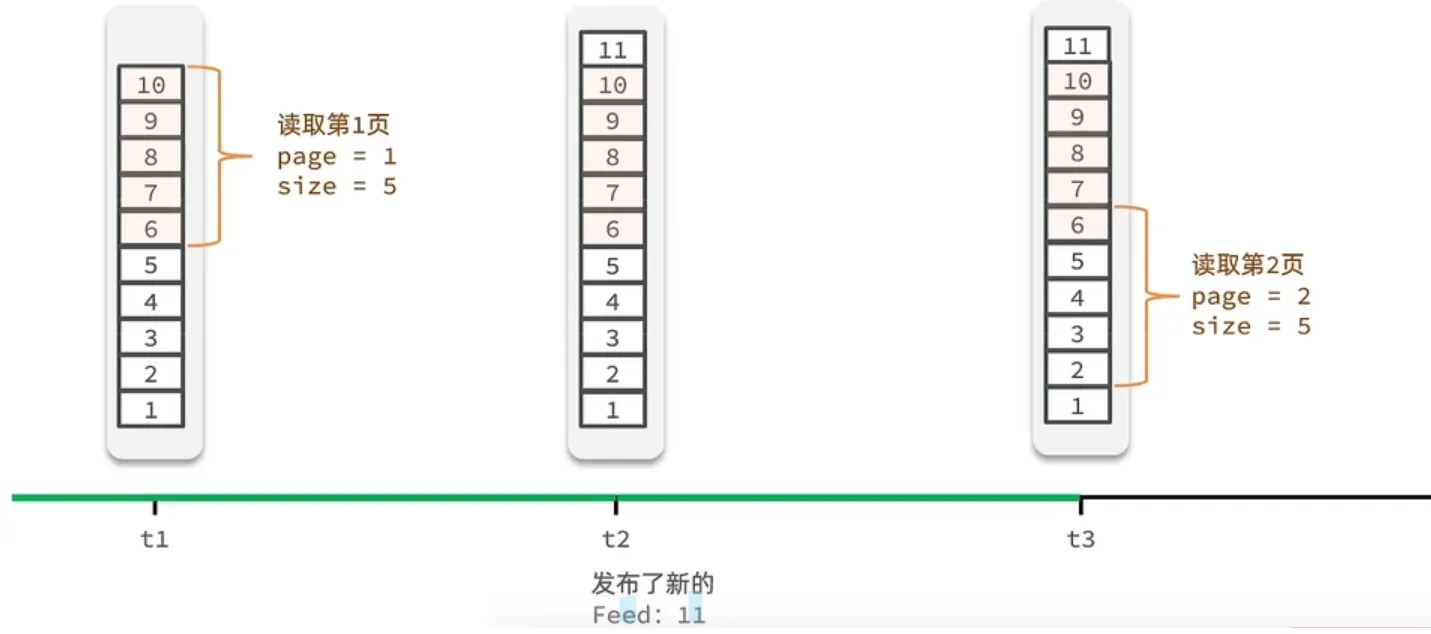
Feed流的滚动分页
我们需要记录每次操作的最后一条,然后从这个位置开始去读取数据
举个例子:我们从t1时刻开始,拿第一页数据,拿到了10~6,然后记录下当前最后一次拿取的记录,就是6,t2时刻发布了新的记录,此时这个11放到最顶上,但是不会影响我们之前记录的6,此时t3时刻来拿第二页,第二页这个时候拿数据,还是从6后一点的5去拿,就拿到了5-1的记录。我们这个地方可以采用sortedSet来做,可以进行范围查询,并且还可以记录当前获取数据时间戳最小值,就可以实现滚动分页了
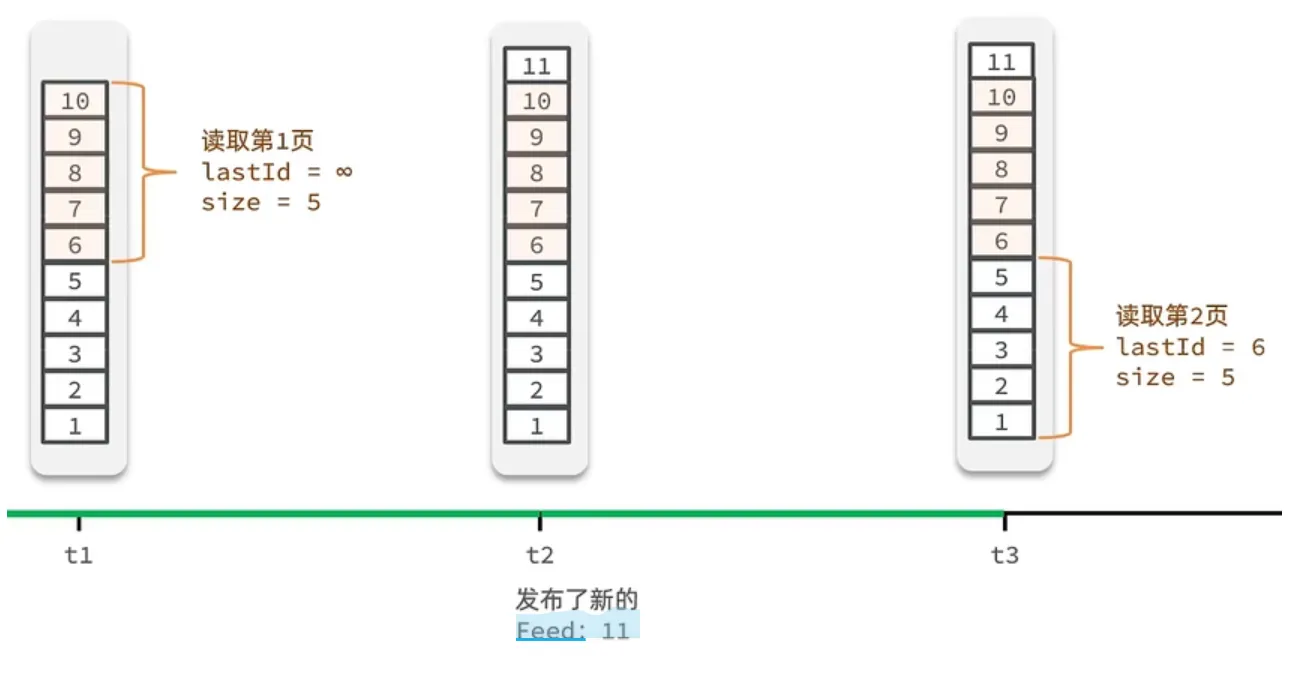
发布博客时进行推送,业务逻辑:
@Override
public Result saveBlog(Blog blog) {
// 获取登录用户
UserDTO user = UserHolder.getUser();
blog.setUserId(user.getId());
// 保存探店博文
boolean result = this.save(blog);
if (!result) {
return Result.fail("新增博客失败");
}
//查询所有粉丝 select * from tb_follow where follow_user_id=?
List<Follow> follows = followService.query().eq("follow_user_id", user.getId()).list();
for (Follow follow : follows) {
//粉丝id
Long userId = follow.getUserId();
String key = "feed:" + userId;
stringRedisTemplate.opsForZSet().add(key, blog.getId().toString(), System.currentTimeMillis());
}
// 返回id
return Result.ok(blog.getId());
}
分页查询收邮箱
需求:在个人主页的“关注”卡片中,查询并展示推送的Blog信息:
具体操作如下:
1、每次查询完成后,我们要分析出查询出数据的最小时间戳,这个值会作为下一次查询的条件
2、我们需要找到与上一次查询相同的查询个数作为偏移量,下次查询时,跳过这些查询过的数据,拿到我们需要的数据
综上:我们的请求参数中就需要携带 lastId:上一次查询的最小时间戳 和偏移量这两个参数。
这两个参数第一次会由前端来指定,以后的查询就根据后台结果作为条件,再次传递到后台。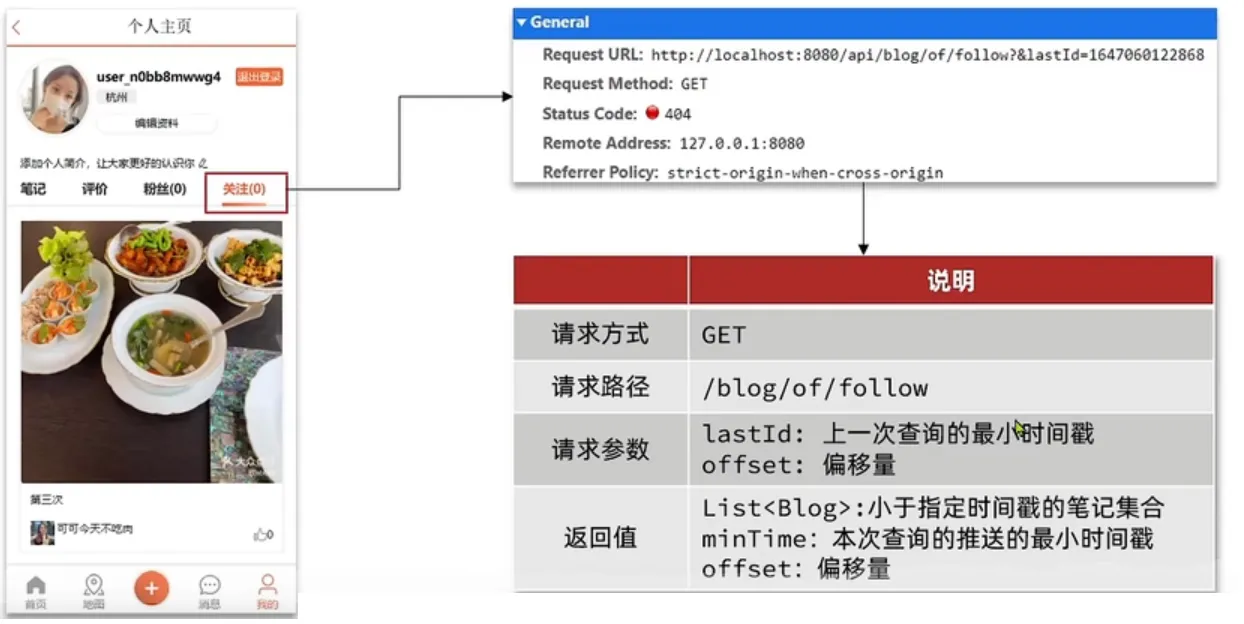
定义滚动返回值实体类
@Data
public class ScrollResult {
private List<?> list;
private Long minTime;
private Integer offset;
}
控制器:
@GetMapping("/of/follow")
public Result queryBlogOfFollow(
@RequestParam("lastId") Long max,
@RequestParam(value = "offset", defaultValue = "0") Integer offset) {
return blogService.queryBlogOfFollow(max, offset);
}
业务逻辑:
@Override
public Result queryBlogOfFollow(Long max, Integer offset) {
Long userId = UserHolder.getUser().getId();
//查询收件箱 zrevrangebyscore key max min limit offset count
String key = FEED_KEY + userId;
Set<ZSetOperations.TypedTuple<String>> typedTuples = stringRedisTemplate.opsForZSet()
.reverseRangeByScoreWithScores(key, 0, max, offset, 2);
if (typedTuples == null || typedTuples.isEmpty()) {
return Result.ok();
}
//解析数据:blogId minTime offset
List<Long> ids = new ArrayList<>(typedTuples.size());
long minTime = 0;
int os = 1;
for (ZSetOperations.TypedTuple<String> tuple : typedTuples) {
//获取id
ids.add(Long.valueOf(tuple.getValue()));
//获取时间
long time = tuple.getScore().longValue();
if (time == minTime) {
os++;
} else {
minTime = time;
os = 1;
}
}
os = minTime == max ? os : os + offset;
//根据id查询博文
List<Blog> blogs = this.query().in("id", ids)
.last("ORDER BY FIELD(id," + StringUtil.join(ids, ",") + ")")
.list();
for (Blog blog : blogs) {
this.queryBlogUser(blog);
this.isBlogLiked(blog);
}
//封装返回数据
ScrollResult scrollResult = new ScrollResult();
scrollResult.setOffset(os);
scrollResult.setList(blogs);
scrollResult.setMinTime(minTime);
return Result.ok(scrollResult);
}
